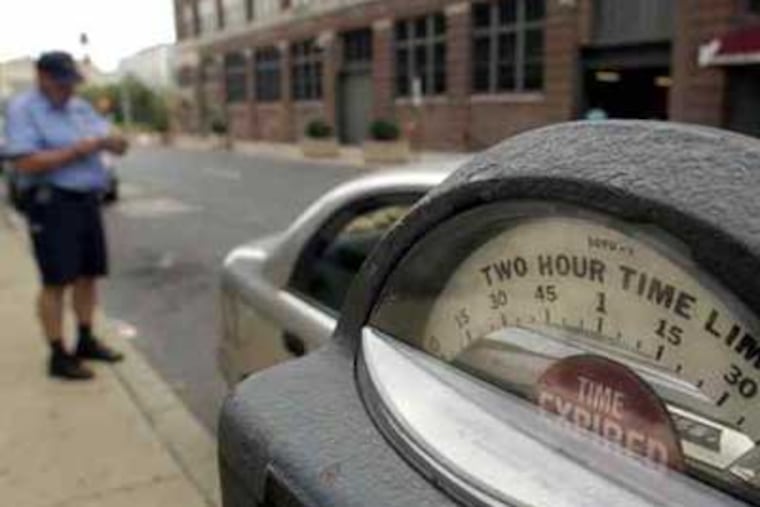Philly parking can be a mess. Now it’s costing us teachers. | Editorial
The city requires clear rules and expectations around parking, with a holistic approach that deals with demand at the neighborhood level and considers the needs of residents and essential employees.

The School District of Philadelphia faces many challenges as it tries to provide students with a basic education, including underpaid teachers, disruptions in the classroom, and violence in the halls. It is also struggling with one of the most contentious issues in the city: parking.
Finding a parking space is a perennial Philly problem. While the post-World War II economic boom and growth of the interstate highway system meant that many cities developed around widespread car ownership, Philadelphia was not one of them. The relative dearth of parking in our city has traditionally meant that commuting is easiest for people who walked to jobs and services within their neighborhoods or took trains and trams to work.
That is not necessarily a bad thing. In the last 20 years, city officials and businesses have begun recognizing the benefits of this inherited landscape. Philadelphia’s walkability has helped drive the growth of neighborhood commercial corridors, bolstered public transportation usage (despite our official underinvestment), and made life easier for the many residents who rely on SEPTA, bikes, and their own two feet to get around.
Still, even the loveliest tree-lined street in Philadelphia often comes with a row of parked cars, and a suburban home invariably comes with a garage. Too many vehicles and not enough space has become the latest flashpoint for the city’s struggling School District.
» READ MORE: For Philly, it’s time to put people before parking spaces | Editorial
District officials have long complained that a lack of parking inhibits their ability to staff certain schools. At a City Council hearing earlier this month, they made the case for action.
The district cited the increasingly competitive market for quality teachers, a shortage the entire state is grappling with but which impacts poor urban and rural school districts the most. Better-resourced districts in affluent suburbs can outbid city schools for available teachers. They can also address the kind of quality-of-life issues, such as parking, that potential employees consider.
City Council, often supportive when it comes to parking problems, was unhelpful. Council President Darrell L. Clarke was sympathetic but blunt. “I’m sure there are a lot of people who would like to have parking on their street, let alone their workplace,” he told the school board. “I’ll let you figure that one out.”
The pushback may seem cold but is not entirely wrongheaded. The mid-century demand to ensure cheap, abundant parking in city centers led to an overreaction, with widespread demolitions for parking lots and highways destroying healthy and thriving neighborhoods, particularly communities of color.
In conversations with district officials, however, they made clear that they aren’t asking the city to pave paradise, they simply need more flexibility to use existing spots in surrounding neighborhoods, many of which would otherwise sit empty during the day. That’s certainly something Council members can help with.
After all, Councilmember Jamie Gauthier, who represents the 3rd District, helped Powel Elementary in West Philadelphia get special parking permits for school staff. The permits, which cost about the same as a transit pass, allow teachers to park on blocks that limit nonresidents to two hours at a time and in nearby city-owned parking lots. Unfortunately, Council’s insistence on implementing policy on a district-by-district basis makes turning this program into a citywide solution difficult, but it shouldn’t be impossible. More broadly, a comprehensive answer to parking is what Philadelphia needs.
» READ MORE: Philadelphia needs a better parking authority. That starts with hiring a qualified executive director. | Editorial
Rather than a confusing and haphazard permit parking network that is defined by block-by-block decisions, it’s essential that the city develop a holistic approach that deals with parking demand at the neighborhood level, considers the needs of residents and essential employees, and creates clear rules and expectations around utilizing street space.
That’s the only way out of the frustrating status quo that means residents receive tickets in some areas while others deal with unenforced double-parking offenses and worse in their neighborhoods.
In the meantime, the district should consider signing teachers up for SEPTA’s Key Advantage program, which would provide employees with free transit passes at a discounted rate for the district. This would be particularly helpful for schools such as the Academy at Palumbo, which is within walking distance of the Broad Street Line and PATCO high-speed line. Other measures also merit consideration, including Mayor Jim Kenney’s proposal of running shuttles for staff at schools where parking is limited.
For the district’s benefit, and the city’s, it is time to embrace comprehensive parking management solutions that ensure that those who need a spot can find a spot — without undermining the walkability that remains one of Philadelphia’s strengths.